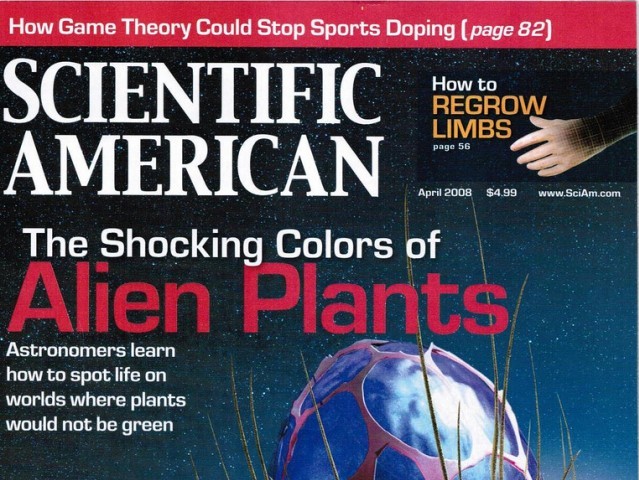The Curious Case of Scientific American
I had a rather curious conversation with a fellow graduate student a few mornings back. This not-to-be-named colleague of mine was surprised to see me reading a copy of Scientific American magazine on the subway. When I asked her why such a thing was surprising, she said, "Well, Scientific American is written for the layperson, is it not? Isn't it a little too low-brow for you?" I chose to answer her question with another question. "As a biologist," I asked her, "do you feel that you could pick up an advanced level physics text book and fully comprehend the math behind the current search for the Higgs bozon particle?" I know that I certainly cannot, nor would I pretend to. However, I was, at that moment, reading an eloquently written article entitled "Dark Worlds" by Drs. Jonathan Feng and Mark Trodden, two highly regarded theoretical and particle physicists who were attempting to explain the nature of dark matter as we currently know it, and how physicists are today trying to unravel the mysteries of dark energy and the expanding universe. Is it written for a "layperson"? Certainly. But it's written for a layperson with an interest in science.
As scientists, we're supposed to be curious people. Yet I find that far too many of us focus on our own area of research only, to the detriment of learning about other highly fascinating areas of current research. A case in point was this student's unwillingness to read a scientific magazine such as Scientific American (which is published by the Nature Publishing Group, by the way). Another case in point is our student seminars, which are poorly attended and generally thought of as a chore. When you treat something as a chore, a chore it will become. I attend seminars because I truly enjoy learning about the fascinating research going on within our own department. I frequently attend other seminars occurring all over U of T's campus as well. I listen to science podcasts, such as "Quirks & Quarks" and "The Naked Scientists." And I read Scientific American.
This brings me back to an earlier comment I made on Firas Moosvi's blog post entitled "5 Things Biologists Need To Know When Presenting To Physicists." I made a comment at the bottom of that particular blog entry where I stated that "while all talks should be presented so as to be understandable to us all, I would also add the caveat that at a certain point some of the onus does rest with the listener; don't just read papers in your own field, for instance." I stand by that comment whole-heartedly. If you only read journal articles directly related to your own area of scientific expertise, you will NOT become a good scientist. The smartest people I know are people who seem to know a whole lot of information about a whole lot of various topics. In this volume of Scientific American alone I learned about such varying research as new malaria vaccines; how scientists are helping design new "supergrids" to supply all of America with cheaper, more efficient electricity; and about the fascinating field of "optogenetics", where scientists hope to treat psychiatric disorders by inserting opsin genes into the cells of the brain so that flashes of light can be used to trigger the firing of specific neurons.
I've never liked the expression "curiosity killed the cat." I think that if we truly want to be world-class scientists, that we have to get out of our respective bubbles and learn about the totality of scientific research occurring all over the world. Why would you not want to, anyway? By ignoring other fields of science, you do yourself a disservice. And if you want to be able to answer the question that your Mom always asks, "What is it that you do, anyway?", then why don't you try writing an article in a style that would be suitable for Scientific American? Now that, in my humble opinion, is a very worthwhile exercise.

